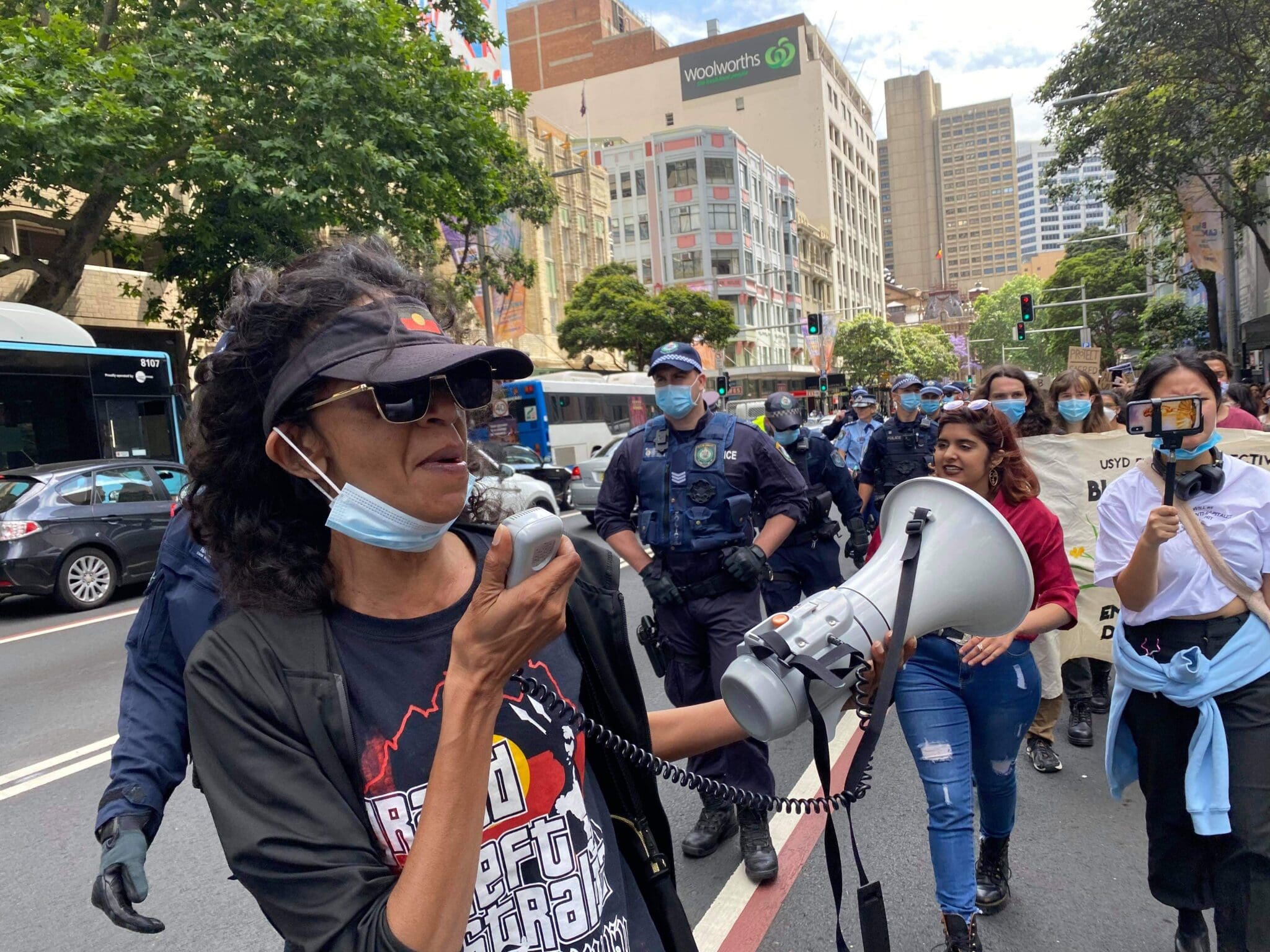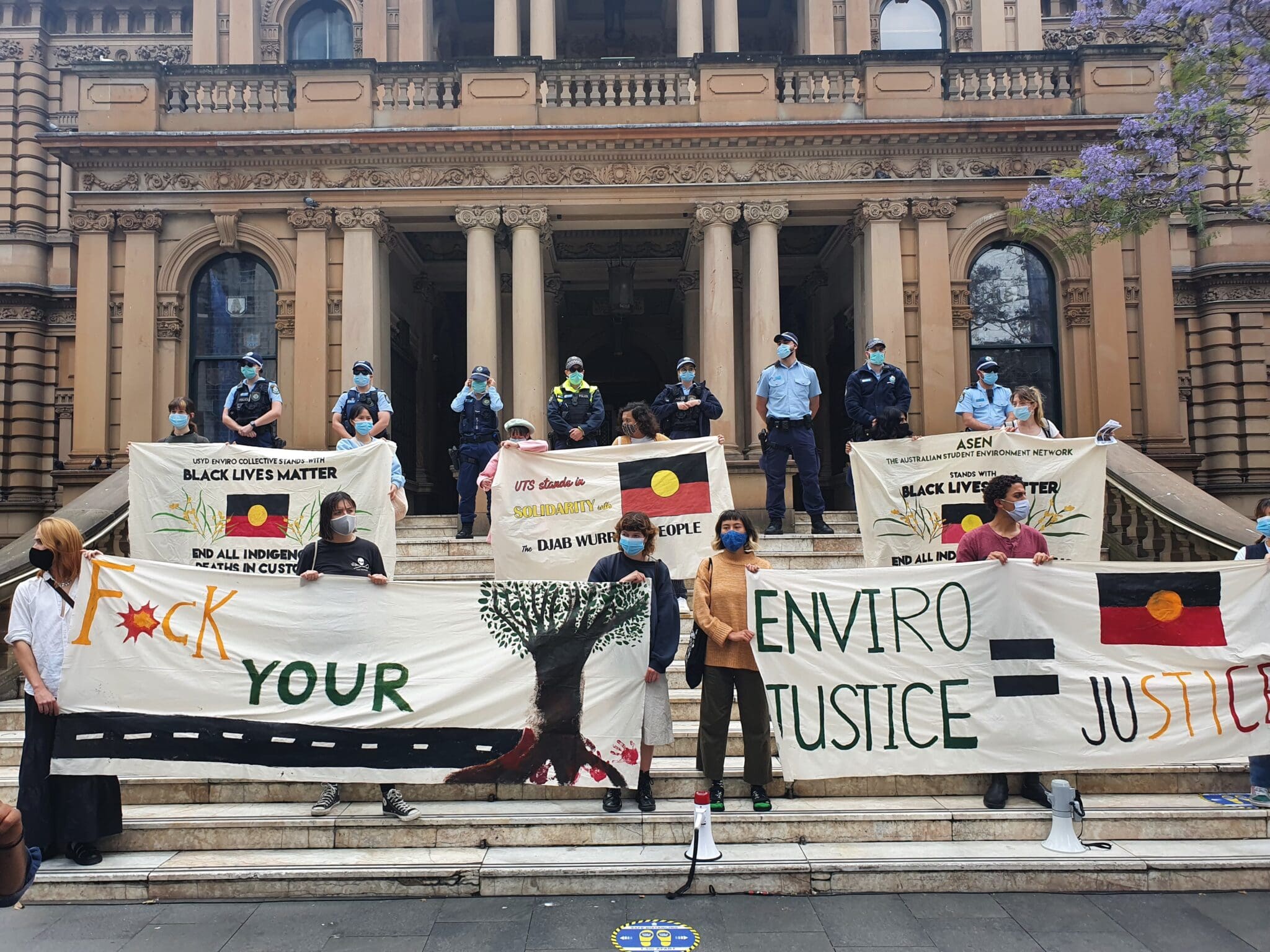Hundreds stood in solidarity with Djab Wurrung today at Sydney’s Town Hall. The rally brought to the forefront the struggle of First Nations people to save the culturally significant, centuries-old trees that are being removed for a highway upgrade. After an extended speak out, protesters took to the road and marched to Hyde Park, despite antagonism from the police.
Organised by the USyd, UNSW and UTS Environment Collectives and Fighting in Solidarity Towards Treaties (FIIST), the speakers demanded an end to the desecration of First Nations’ land, history and culture by private or state interests. They also demanded that the government immediately recognise the sovereignty of First Nations peoples’ and the autonomy of these peoples over their land and resources.
Last week, the Djab Wurring directions tree was lost after years of fighting to protect it., with Around 60 people were people arrested by police trying to stop its removal, and all protestersfaced immense amounts of police brutality and repression.
The nationwide uproar about this issue has forced the Victorian Government to halt progress on the highway for three weeks, but there is no guarantee that after this time, the next steps will not continue as planned.
Uncle Dave Bell gave a Welcome to Country, acknowledging Aboriginal peoples from all over NSW.
Gwenda Stanley from FIIST spoke next, setting the tone for the protest by questioning the notion of reconciliation, and the surface level nature of NAIDOC Week.
“You want to talk about reconciliation? Reconciliation is about giving back our land. Reconciliation is about paying for the war crimes. The genocide, the ecocide of the environment. We don’t want coal seam gas in Gomeroi country.”
“You protected your Captain Cook statue but you cannot save a birthing tree,” she yelled to the police who were lined up behind speakers for the duration of the rally.
Chelsea Ahern, who has been on the ground protecting Djab Wurrung, sent a statement to Harpreet Kaur Dhillon to be read out, which details the horrific nature of the on-the-ground situation at Djab Wurrung.
“On a daily occurrence both day and night, we are facing racial abuse, slurs. We have had threats, people approach us with anger and aggression, fires started by outsiders trying to move us on, fireworks being shot at us, urination in front of our women and children on our sacred land by intoxicated people of all ages and objects thrown at our birthing trees.”
“When she was cut down, there was cheering, celebration of victory and no cultural sensitivity or respect from the workers or security on site. She was then dumped into a semitrailer and paraded past grieving First Nations people and supporters who have protected her from this fate for over two years.”
David Shoebridge MLC spoke next, highlighting the scale of the problem across the country.
“If you think this is just a Victorian thing, you’re wrong. It’s happening in every state, in every territory, in every level of government. It’s in the DNA of the planning system, not just in Victoria but in this entire country. We need to call it out and we need to stop it.
“We all know what the answer to this is, protecting First Nations culture. It’s getting rid of the MPs and the bureaucrats, and it’s putting Aboriginal people, traditional owners, traditional custodians and give them the power to make decisions and protect their own culture. That’s the change we need.”
Kya Branch, NUS First Nations Officer, said “they need our voices to be heard, so that we are able to start making changes, so that we can dismantle this system, not brick by brick, but all at once.”
Michael Burnard represented the Australian Student Environment Network (ASEN), bringing attention to the importance of fighting for First Nations justice and climate justice hand in hand.
“The exploitation of First Nations people and their land is directly linked to the same structures of capitalism that allow only 100 companies to produce 71% of all greenhouse gases, all the while telling us we need to change our personal habits to save the world from their machinations.”
Wongutha-Yamatji man Meyne Wyatt spoke about the gold mining happening in his country in Western Australia, saying that it’s only the white people that care about the gold. He spoke about the sacred site destroyed by Rio Tinto and the many more that they plan to destroy.
“Indigenous did not destroy the earth. Colonialism and capitalism destroyed the earth.”
“We need you, our non-Indigenous brothers and sisters to stand with us.”
At the completion of the speeches, protesters began marching to Hyde Park, chanting “when Djab Wurring is under attack, what do we do? Stand up, fight back” and “too many coppers, not enough justice.”

Police initially attempted to stop the march from happening, despite protests of 500 people now being allowed under the Public Health Order. Protesters, however, pushed through and the march made its way successfully up Park Street and into Hyde Park. This rally is the largest action to have occurred without physical police repression in months.
Aunty Lynda June-Coe wrapped the action up next to the Hyde Park fountain, using her time at the megaphone to reflect on the dangers that come from NSW policing not only Aboriginal people but also everybody else so intensely.
“Thank you for standing in solidarity. That tree down there isn’t just a tree. She’s one of our ancestors, she’s one of our elders, and she has practised and birthed for generations down there.”
“The structures in this country are fundamentally racist, and I’m going to come back to the question. What does justice look like on stolen land? Justice for me means you give us our land back.”

There is another Djap Wurrung solidarity action planned for Monday in the Domain.





